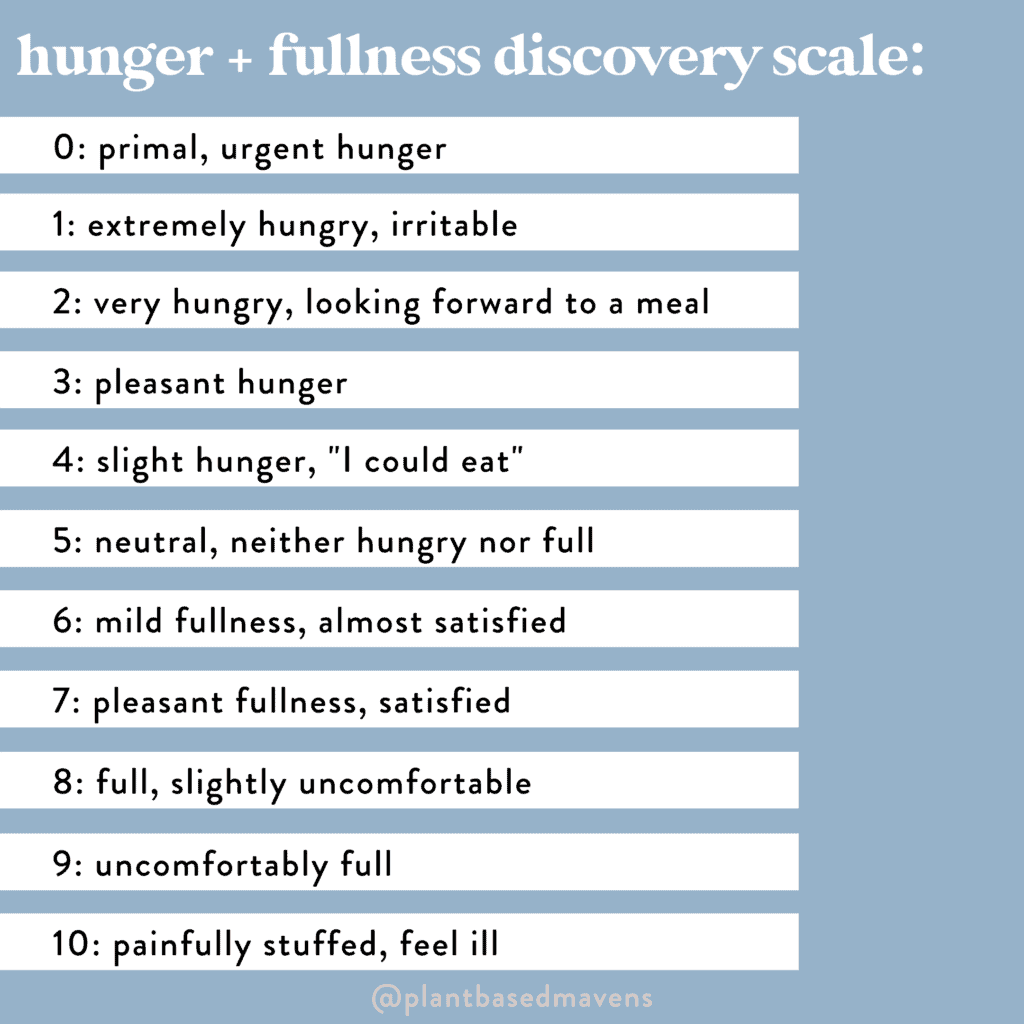Knowing when you’re hungry and responding to that hunger might seem like a simple thing, but many of us have received mixed messages about food that have put us out of touch with our hunger cues. Your head might be filled with rules like “never eat after 7pm” that lead you to ignore 8pm hunger. The many reasons you might be disconnected from your hunger cues boil down to two things: you may be disconnected from your body’s physical sensations, so you don’t notice you’re hungry until it’s an emergency, or you may not trust your hunger and therefore deny it when it arises.
Both hunger and fullness are about strengthening the mind/body connection (one of the key skills I help my clients develop) so that you are able to better listen to and respond to your body’s signals. Honoring both your hunger and fullness is all about building that all important trust between your mind and body. It also helps you restore trust in yourself around food, even if that trust has been degraded. Let’s dive in to some ways you can start to reconnect with your hunger cues and how to use those cues to build a healthier relationship with food and with yourself.

How You Might Be Silencing Your Hunger Cues
We silence our hunger for many different reasons, but most of them fit into two categories:
- Internalized diet culture messages that hunger cues can’t be trusted. Signs that you might be silencing your hunger cues for this reason include:
- Trying to quiet your hunger or trick your body with zero-calorie or low-calorie foods, caffeine, diet soda, baked/airy chips, or chewing gum
- Responding to your hunger by trying to distract yourself from it
- Overriding your hunger in order to follow specific rules about when and how to eat
- Living in a chaotic or stressful way makes it difficult to connect with your body and hear hunger signals until it becomes an emergency. Signs that you might be silencing your hunger cues for this reason include:
- Not having regularly scheduled times for breakfast, lunch, dinner, and snacks
- Feeling as if you don’t have time to plan ahead for meals and often eat out of extreme convenience (in other words, grabbing the nearest thing regardless of nutrition or what sounds good)
- Regularly not having groceries at home to make balanced meals
- Frequently reaching the point of fatigue, irritability, dizziness, or feeling ravenous before eating
Why Understanding Your Hunger Cues Is Important
Sensations of hunger are a sign that your body is working just as it should to keep you healthy and nourished. When you ignore your hunger, you send your body into an urgent state of what’s known as “primal hunger” that often results in overeating.
Let’s compare hunger to another normal, healthy body function – breathing. Ignoring your hunger is like trying to hold your breath, and primal hunger is like inevitably needing to gasp for air. Instead of breathing in a steady, rhythmic way, you end up having to urgently gasp for air. The same is true for trying to suppress your hunger, and then experiencing the urgent need to eat.
When you try to control your hunger, you put yourself into the cycle of overriding your hunger, feeling primal hunger, feeling out of control when you finally eat, feeling guilt or shame because of the out-of-control eating, and then back to trying to control your hunger again. It’s a vicious cycle to be in. The good news? You can step out of it with 3 simple steps.
3 Steps To Get In Touch With Your Hunger Cues
Step 1: Study your unique hunger signals.
We all experience hunger a little differently. Your hunger might show up as the stereotypical stomach growl, but it might also be more subtle sensations like a lack of focus, changes in mood, or a headache. Before you eat your next meal, pause for a few moments and tap into your experience of hunger. Where do you feel it in your body? And how do you experience it mentally and emotionally? Write down your experience for a few meals and see if you notice patterns.
Step 2: Strengthen the mind/body connection to find your hunger sweet spot.
To do this, you can use the Hunger Discovery Scale. It’s a 0-10 system for rating your hunger and fullness. On this scale, 0 = painful, intense, urgent hunger. 10 = Stuffed fullness to the point of feeling ill. Before you eat, give your hunger a rating 0-10.

If the scale feels like too much, simply use the categories of pleasant, unpleasant, and neutral. Pleasant meaning you are pleasantly hungry, unpleasant meaning you are uncomfortably or even urgently hungry, and neutral meaning you aren’t feeling any sensations of hunger. After practicing this for a while, you will begin to identify the sweet spot of pleasant, biological hunger before you dip into that unpleasant, urgent hunger.
Step 3: Respond to your hunger with positive self-talk.
If you’re reading this, then you likely have some negative self-talk around your hunger. When you notice you’re hungry, maybe you think, “I shouldn’t be hungry, I just ate an hour ago” or “my plan says I’m not supposed to eat before bed, so I can’t eat now!” In this step, you’re going to unlearn those automatic negative thoughts and relearn gratitude and respect for your body. Whenever those negative thoughts pop up, try to replace them with gratitude for your body. An example: “Thank you body for communicating your needs to me.”
Over to you…
So, to review:
- Study your unique hunger signals. How does hunger feel in your body beyond just a stomach growl?
- Strengthen your mind/body connection by identifying your hunger sweet spot (the point at which eating will feel most enjoyable). You can do this with the 0-10 Hunger Discovery Scale or the pleasant/unpleasant/neutral rating.
- Respond to your hunger with positive self-talk. Express gratitude for your working body.
Remember, hunger will fluctuate from day to day. It’s normal to have daily rhythms in your eating, but it’s important to respect your hunger on days when you find yourself more hungry than usual. Our bodies average out our energy expenditure and intake over time. It’s not an exact, day-to-day thing, so that hike we took yesterday might leave us extra hungry in the days following. Getting in touch with your biological hunger cues also sets you up to be able to tell the difference between biological hunger and other reasons to eat like emotions or boredom, which we’ll talk about another day.
Are you an intuitive eater? Take the quiz to find out!
Take the Plant-based Intuitive Eating Quiz and find out if you’re stuck in diet mentality or an intuitive eating pro. (Plus, what to do next to have a better relationship with food.)


